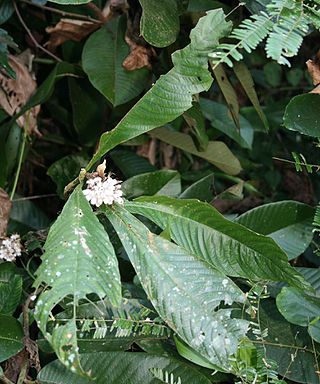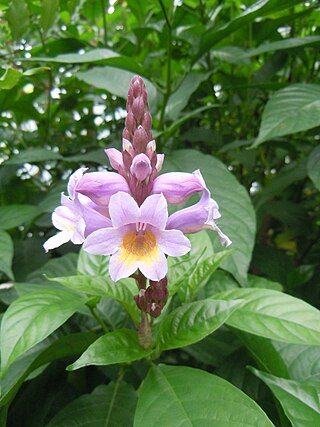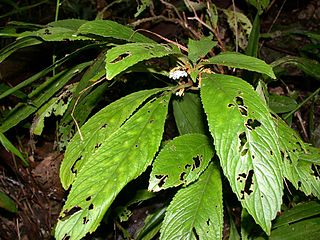
Acanthaceae is a family of dicotyledonous flowering plants containing almost 250 genera and about 2500 species. Most are tropical herbs, shrubs, or twining vines; some are epiphytes. Only a few species are distributed in temperate regions. The four main centres of distribution are Indonesia and Malaysia, Africa, Brazil, and Central America. Representatives of the family can be found in nearly every habitat, including dense or open forests, scrublands, wet fields and valleys, sea coast and marine areas, swamps, and mangrove forests.

Strobilanthes is a genus of about 350 species of flowering plants in the family Acanthaceae, mostly native to tropical Asia and Madagascar, but with a few species extending north into temperate regions of Asia. Many species are cultivated for their two-lipped, hooded flowers in shades of blue, pink, white and purple. Most are frost-tender and require protection in frost-prone areas. The genus is most famed for its many species which bloom on long cycles of several years, such as Strobilanthes wightii which blooms every thirteen years.

Aeschynanthus is a genus of about 150 species of evergreen subtropical and tropical plants in the family Gesneriaceae. They are usually trailing epiphytes with brightly colored flowers that are pollinated by sunbirds. The genus name comes from a contraction of aischuno and anthos (flower). The common name for some species is lipstick plant, which comes from the appearance of the developing buds emerging from the calyces. A full list of the accepted species and their synonyms can be found in the Smithsonian Institution's World Checklist of Gesneriaceae.

Dicliptera is a genus of flowering plants in the bear's breeches family, Acanthaceae. It includes 223 species native to the tropics and subtropics worldwide. Well-known synonyms include Peristrophe and Dactylostegium.

Hygrophila, commonly known as swampweeds, is a genus of flowering plants in the acanthus family, Acanthaceae. There are about 80 to 100 species, of which many are aquatic plants. The genus is distributed across the tropical and subtropical world. It is one of only two genera in its family that contains aquatic plants, the other being Justicia. The genus is treated in the tribe Hygrophileae, which is noted as being in need of revision at the genus level, meaning the current taxonomic boundaries of Hygrophila are likely to change in the future.

Lepidagathis is a genus of flowering plants in the family Acanthaceae. It includes 151 species native to the tropics of the Americas, sub-Saharan Africa, south and southeast Asia, southern China, Malesia, and New Guinea.

Hypoestes is a flowering plant genus of about 150 species. They are widely distributed throughout the tropical and subtropical lands around the Indian Ocean, and some adjacent regions.

The genus Asystasia belongs to the family Acanthaceae and comprises 59 species found in the tropics of Africa, Asia, Australia, and New Guinea. It includes the weedy species Asystasia gangetica.

Pseuderanthemum is a genus of plants in family Acanthaceae with a pantropical distribution.

Urophyllum is a genus of flowering plant in the family Rubiaceae, native to from south China to Tropical Asia. The genus was established by Nathaniel Wallich in 1824.

Argostemma is a genus of flowering plants in the family Rubiaceae. It can be found in (sub)tropical Asia and western and west-central tropical Africa.

Eranthemum is a genus of plants in the family Acanthaceae. It includes 23 species native to the Indian subcontinent, Indochina, southern China, Sumatra, and Java.

Mycetia is a genus of flowering plants in the family Rubiaceae. It includes 54 species, ranging from the Indian subcontinent through Indochina, southern China, and Malesia to New Guinea.

Phlogacanthus is a genus of flowering plants in the family Acanthaceae and tribe Andrographideae. Its distribution includes India through to Indo-China, southern China, Java, and Sulawesi.

Rhynchotechum is a genus of plants in the family Gesneriaceae, subfamily Didymocarpoideae. Species distribution records are mostly from India, Sri Lanka, China through to southern Japan, Indo-China and Malesia through to New Guinea.

Rungia is a genus of flowering plants belonging to the family Acanthaceae.
Rostellularia is a genus of flowering plants belonging to the family Acanthaceae.
Ptyssiglottis is a genus of flowering plants belonging to the family Acanthaceae. It includes 38 species native to tropical Asia and Papuasia, ranging from Sri Lanka to Indochina, Malesia, New Guinea, and the Bismarck Archipelago.

Praravinia is a genus of flowering plants belonging to the family Rubiaceae.






















